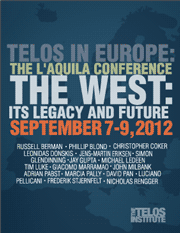This paper was presented at Telos in Europe: The L’Aquila Conference, held on September 7-9, 2012, in L’Aquila, Italy.
 It is with Tocqueville that the term democracy acquires a positive connotation. When the first part of Democracy in America appeared in 1835, the very title came as a surprise. It was radically new, and it struck people like a bolt from the blue. Tocqueville took another unprecedented step when he associated democracy and equality. According to Aristotle, equality is an aspect of justice, not democracy. The equality that Tocqueville had in mind was not political or economic, but social; it referred to a social condition arising from equality of condition and from a pervasive egalitarian ethos. The latter reflected, in turn, the absence of a feudal past in the New World. Back in Europe and France, Tocqueville lived through the events of 1848, when the notion of “revolution” gained a socialist character. It is at such point that Tocqueville perceives a conflict between socialism and liberty: socialism means equality without liberty, while democracy stands for equality and freedom. He thus starts a new debate, that of the problematic relationship between equality and liberty, which draws on his dual political experiences in Europe and America. He discovers that it is through their synthesis that a political system capable of combining the best aspects of liberty and equality might emerge. Liberal democracy could therefore be born of the encounter between Europe and America, that is to say, the two main parts of the Western World.
It is with Tocqueville that the term democracy acquires a positive connotation. When the first part of Democracy in America appeared in 1835, the very title came as a surprise. It was radically new, and it struck people like a bolt from the blue. Tocqueville took another unprecedented step when he associated democracy and equality. According to Aristotle, equality is an aspect of justice, not democracy. The equality that Tocqueville had in mind was not political or economic, but social; it referred to a social condition arising from equality of condition and from a pervasive egalitarian ethos. The latter reflected, in turn, the absence of a feudal past in the New World. Back in Europe and France, Tocqueville lived through the events of 1848, when the notion of “revolution” gained a socialist character. It is at such point that Tocqueville perceives a conflict between socialism and liberty: socialism means equality without liberty, while democracy stands for equality and freedom. He thus starts a new debate, that of the problematic relationship between equality and liberty, which draws on his dual political experiences in Europe and America. He discovers that it is through their synthesis that a political system capable of combining the best aspects of liberty and equality might emerge. Liberal democracy could therefore be born of the encounter between Europe and America, that is to say, the two main parts of the Western World.







